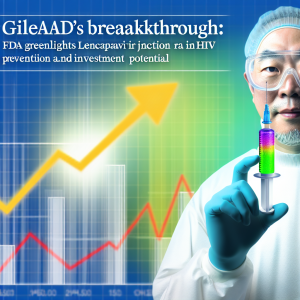Gilead’s Game-Changer in HIV Prevention: What Investors and Advisors Must Know Now
In a landmark move that could redefine the trajectory of the global HIV epidemic, the FDA has greenlit Gilead Sciences’ new twice-yearly antiviral injection, Yeztugo (lenacapavir), for HIV prevention. This breakthrough is not just a medical milestone—it’s a potential catalyst for reshaping both public health outcomes and investment landscapes in biotech and pharma. But savvy investors and advisors need to look beyond the headlines to grasp the full implications and emerging challenges.
Why Yeztugo Is a Game-Changer
Yeztugo’s twice-yearly dosing schedule is revolutionary compared to existing HIV prevention options. Current PrEP (pre-exposure prophylaxis) medications, including Gilead’s own daily pills Truvada and Descovy, require daily adherence, while GSK’s injectable Apretude demands dosing every two months. Yeztugo’s six-month interval drastically reduces the burden on patients, addressing a critical barrier to consistent use: convenience and stigma.
The clinical data is compelling. In 2024 trials, Yeztugo virtually eliminated new HIV infections, showing 99.9% efficacy in diverse populations, including cisgender men, transgender individuals, and cisgender women—a demographic often underrepresented in earlier studies. For example, among over 5,000 women in one trial, none contracted HIV after receiving the injection, demonstrating 100% effectiveness. This level of protection surpasses existing PrEP options and could be a pivotal tool in curbing new infections.
The Market and Pricing Dynamics
Yeztugo’s list price in the U.S. is about $28,218 annually before insurance, comparable to current branded PrEP options but significantly higher than the estimated manufacturing cost, which analysts suggest could be as low as $26 to $40 per year. This vast gap spotlights a persistent issue in pharma: pricing versus accessibility.
Gilead’s commitment to broad insurance coverage, copay assistance, and free supply programs for uninsured patients is encouraging. The company also licensed generic manufacturers to produce affordable versions for 120 low- and lower-middle-income countries and pledged to supply up to 2 million doses at no profit before generics hit the market. This global approach aligns with the reality that HIV transcends borders and requires scalable solutions.
Investor Insight: A $4 Billion Opportunity Amidst Challenges
Mizuho analysts forecast peak global sales of around $4 billion for lenacapavir’s dual role in prevention and treatment. This positions Gilead to capitalize on a growing market driven by unmet needs and improved adherence potential. However, investors must weigh this against political and funding uncertainties.
The Elephant in the Room: Federal Funding Cuts
The Trump administration’s proposed cuts to federal HIV prevention funding and Medicaid pose a real threat to Yeztugo’s rollout and uptake in the U.S. Medicaid covers approximately 40% of nonelderly adults with HIV, making it a critical access point for underserved populations disproportionately affected by HIV—Black Americans and Hispanics, who represent 39% and 31% of new diagnoses respectively but are underrepresented among PrEP users.
If these cuts materialize, they could destabilize prevention programs, reduce access to medications like Yeztugo, and potentially reverse progress in infection rates. Advocacy and vigilance around federal budgets are essential for sustaining the momentum.
What Should Investors and Advisors Do Differently?
-
Monitor Policy Developments Closely: Federal funding decisions will directly impact market access and sales trajectories. Investors should track legislative sessions and advocacy outcomes, as these will influence the sustainability of HIV prevention programs.
-
Evaluate Gilead’s Pipeline and Partnerships: Yeztugo is part of a broader strategy including treatment (Sunlenca) and global licensing deals. Investors should assess how these components synergize to drive long-term growth.
-
Consider Socio-Demographic Trends: The HIV epidemic disproportionately affects marginalized communities. Products that address stigma and adherence barriers, like Yeztugo, may gain traction faster in these groups, potentially accelerating market penetration.
-
Leverage Data on Adherence and Real-World Use: The true test will be how well Yeztugo performs outside clinical trials. Advisors should watch for real-world efficacy data and insurance coverage trends to guide investment timing.
- Spot Emerging Competitors and Innovations: While Yeztugo leads now, competition from GSK and others could intensify. Innovation in dosing schedules, delivery methods, and combination therapies will shape the competitive landscape.
Looking Ahead: The Next Frontier in HIV Prevention
Yeztugo’s approval signals a shift towards long-acting, user-friendly HIV prevention strategies. This aligns with broader healthcare trends favoring convenience, privacy, and reducing stigma. For investors, this means opportunities not just in HIV but in other chronic disease areas where adherence is a challenge.
Moreover, the economic argument for prevention is strong. The WHO reported 1.3 million new HIV infections and 630,000 deaths worldwide in 2023, with the U.S. alone seeing 700 new cases weekly. Preventing infections saves healthcare costs and improves quality of life, making successful PrEP products like Yeztugo attractive from a public health and financial perspective.
Final Takeaway
Yeztugo is more than a new drug—it’s a potential inflection point in the fight against HIV and a lucrative opportunity for investors who understand the interplay of science, policy, and market dynamics. Staying informed on funding landscapes, demographic shifts, and real-world adoption will be key to capitalizing on this breakthrough. At Extreme Investor Network, we’ll continue to provide you with the deep insights and forward-looking analysis you need to navigate this evolving space confidently.
Sources:
- World Health Organization (WHO) HIV/AIDS Data, 2023
- Mizuho Securities Analysis, 2024
- KFF (Kaiser Family Foundation) on Medicaid and HIV Coverage
- AIDSVu Surveillance Data, Emory University Rollins School of Public Health
Stay tuned for ongoing updates and strategic investment advice on this and other transformative healthcare innovations.
Source: FDA approves Gilead HIV prevention injection lenacapavir

